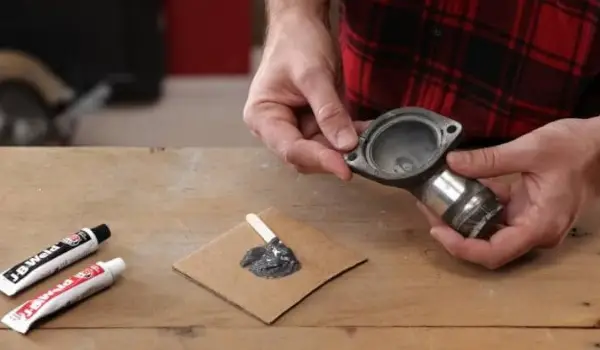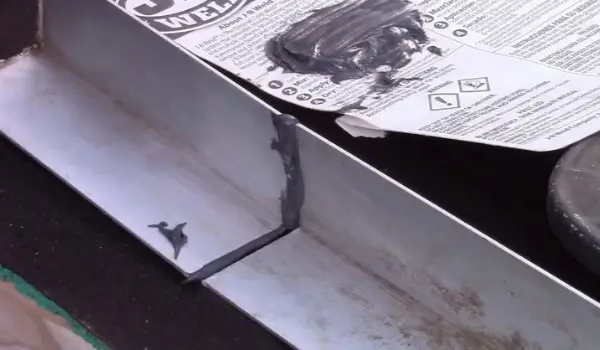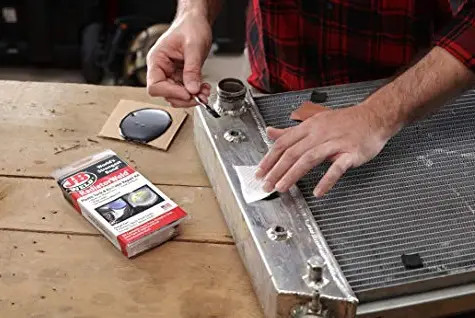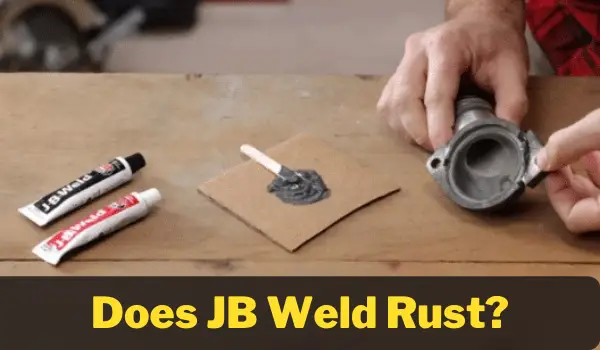There have been several opinions and debates on the effectiveness of JB weld. Some claim it is just effective in bonding metal, while some say it can prevent and protect the metal from rust. So, on this topic, does Jb weld rust? We will share the right information with you on what JB Weld below.
JB Weld does not rust. JB Weld is 100% waterproof and will not break down when exposed to moisture or water. We recommend sanding your finished weld, especially on metal surfaces, before applying. Applying a thin layer of paste wax over the weld promotes rust resistance.
Also, JB weld is a very effective epoxy, but it is not an anti-rust treatment. If you use JB weld to seal rust in, the rust may continue to eat away the metal underneath the JB weld and weaken it.
JB weld will only act as a sealant and prevent oxidizing agents like water and moisture from getting to the metal, thereby preventing corrosion. However, if the Jb weld you apply on the metal is too thin, it will not prevent rust for a long time. So, ensure it is very thick.
Contents
How to Use J-B Weld on Metals
Using j-b weld on metals and getting maximum results requires you to apply it on the metal surface the right way. Here is a simple step to use j-b weld on metals:

- Prepare the metal to receive the j-b weld coating. Before applying j-b weld to the metal, you have to clean it. Use sandpaper or wire brush to scrub off the rust from the metal surface to make it clean. Ensure that you take off the brown powdery rust on the surface of the iron.
- Coat the metal surface with a j-b weld. When coating the metal item, ensure that you are applying the j-b weld generously. If the coat of j-b weld on the metal surface is too thin, the metal will give way to rust in a short time. Ensure that the coating is thick enough. Apply a second coat if you did not get a thick layer after the first coat. If possible, repeat the coating process until you achieve the desired outcome.
- After applying j-b weld to the surface of the metal, you can proceed to paint the metal item if that is your aim.
Pros of Using J-B Weld
JB weld is not the only solution to rust. There are many products in the market you can pick from. However, j-b weld stands out because:

- It Is Waterproof: J-b weld is waterproof. It protects your metal against water and moisture, which are rust-causing elements. As such, you protect your metal from corrosion. If water or moisture comes in contact with the surface of your metal that has been coated with j-b weld, the water does not stay on the surface because the metal repels it.
- J-B Weld Is Versatile: J-b weld is suitable for various surfaces like steel, paper, fiberglass, glass, metal, marble, etc. You can use it to remove rust from several surface types. Unlike some other products that are selective, j-b weld is not.
- J-B Weld Seals Leaks: Aside from working on rust, j-b weld is helpful for sealing small leaks in galvanized steel and copper materials. If you have a leaking pipe or any other item you use in holding content, you can use a j-b weld to seal the holes.
- J-B Weld Is Useful for Replacing Broken Metal Parts: If your metal has rusted and some parts have fallen off, you can use a j-b weld to replace those parts that have fallen off. When applied to a surface, j-b weld hardens as it dries. The hardened part can blend with the metal, creating a substance where there was none. If you apply j-b weld to a broken metal surface, it will harden within 35 minutes. After an hour’s time, you can work on the steel. So if you have a steel rod you want to cure with a j-b weld, you can start working on it once the j-b weld is dried on it. You can cut, file, drill, or paint the rod once it is ready.
Tips for Using J-B Weld Effectively
To get the best out of using j-b weld for your metals, you need a few tips to help you along the way.

- Ensure that you get a thick coating on the metal item you are applying it to. If the coating of j-b weld on your item is too thin, it is only a matter of time before it lets in moisture and water and welcomes corrosion.
- When using a j-b weld, ensure that you coat every area of the metal item. If you omit an edge or a crevice, that part of the metal will start to corrode, and the corrosion will spread to every area of the metal over time. Therefore, it is advisable to be patient when applying j-b weld to any item. One way to get the best out of using j-b weld is to apply it on the substrate carefully and thoroughly.
- Before using a j-b weld on the metal surface, ensure to scrub off the rust.
Conclusion
J-b weld does not rust. However, the metal it is applied to can still rust if the coat of j-b weld on it is too thin. The metal can also rust if the rust on it is not properly removed before applying j-b weld. Also, if some hidden areas and crevices are not coated with j-b weld, they will rust, and the rust can spread to other parts of the metal.


